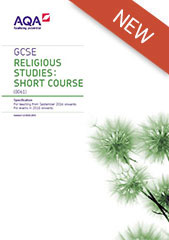3.2 Section B: Thematic studies: religious, philosophical and ethical studies
Students should study both Theme A: Relationships and families and Theme B: Religion, peace and conflict.
Students should study religious and non-religious beliefs, such as atheism and humanism, in contemporary British society about the issues raised.
In addition, students must also study religious, philosophical and ethical arguments related to the issues raised, and their impact and influence on the modern world.
Students will be expected to show their understanding of religion through the application of teachings from religion and beliefs. They will also be expected to make specific references to sources of wisdom and authority including scripture and/or sacred texts. They may refer to any relevant religious text such as the Pali Canon, the sermons of the Buddha, the Bible, the Catechism of the Catholic Church, the Vedas and Upanishads, the Qur’an and Hadith, the Torah and Talmud, and the Guru Granth Sahib.
As part of the supporting material for this specification, AQA will publish a list of appropriate texts. These will not be required for study, alternatives may be used and no questions will be set on them.
Students should be able to demonstrate the knowledge that and understanding that:
- the religious traditions of Great Britain are, in the main, Christian
- the religious traditions in Great Britain are diverse.
Students may draw on Christianity, Buddhism, Hinduism, Islam, Judaism and Sikhism as well as other religious and non religious beliefs such as atheism and humanism.
Theme A: Relationships and families
Students should study religious teachings, and religious, philosophical and ethical arguments, relating to the issues that follow, and their impact and influence in the modern world. They should be aware of contrasting perspectives in contemporary British society on all of these issues.
They must be able to explain contrasting beliefs on the following three issues with reference to the main religious tradition in Britain (Christianity) and a contrasting belilef:
- Contraception.
- Sexual relationships before marriage.
- Homosexual relationships.
Sex, marriage and divorce
- Human sexuality including: heterosexual and homosexual relationships.
- Sexual relationships before and outside of marriage.
- Contraception and family planning.
- The nature and purpose of marriage.
- Same-sex marriage and cohabitation.
- Divorce, including reasons for divorce, and remarrying.
- Ethical arguments related to divorce, including those based on the sanctity of marriage vows and compassion.
Families and gender equality
- The nature of families, including:
- the role of parents and children
- extended families and the nuclear family.
- The purpose of families, including:
- procreation
- stability and the protection of children
- educating children in a faith.
- Contemporary family issues including:
- same-sex parents
- polygamy.
- The roles of men and women.
- Gender equality.
- Gender prejudice and discrimination, including examples.
Theme B: Religion, peace and conflict
Students should study religious teachings, and religious, philosophical and ethical arguments, relating to the issues that follow, and their impact and influence in the modern world. They should be aware of contrasting perspectives in contemporary British society on all of these issues.
On the following three issues they must be able to explain a belief from the main religious tradition in Britain (Christianity) and a contrasting belief:
- Violence.
- Weapons of mass destruction.
- Pacifism.
Religion, violence, terrorism and war
- The meaning and significance of:
- peace
- justice
- forgiveness
- reconciliation.
- Violence, including violent protest.
- Terrorism.
- Reasons for war, including greed, self-defence and retaliation.
- The just war theory, including the criteria for a just war.
- Holy war.
- Pacifism.
Religion and belief in 21 st century conflict
- Religion and belief as a cause of war and violence in the contemporary world.
- Nuclear weapons, including nuclear deterrence.
- The use of weapons of mass destruction.
- Religion and peace-making in the contemporary world including the work of individuals influenced by religious teaching.
- Religious responses to the victims of war including the work of one present day religious organisation.
